Stories from the resistance
One year in
Elizabeth McCormick of the Immigrant Rights Project
Photos by Greg Bollinger unless otherwise noted
On November 9, 2016, “Resist” became a rallying cry for those opposed to a Trump presidency and its implications. Here’s a look at the local movement one year later.
Immigrant Rights Project
As part of the Boesche Legal Clinic at TU’s College of Law, the Immigrant Rights Project (IRP) offers pro bono legal help for people seeking asylum in the U.S., non-citizen victims of crime, and non-citizen minors, and informs undocumented citizens of their rights, like what is required and not required of them if they encounter Immigration and Customs Enforcement agents.
IRP Director Elizabeth McCormick, who has worked with immigrants for 25 years, said interest in the project has surged since last year’s presidential election.
“I think two things have happened,” she said. “The students in law school at the moment are very engaged in civic justice work … and the added layer of the sort of ‘attack’ on justice in a variety of layers, in particular on immigrants … I think [Trump] has inspired a lot of people to go to law school and to fight back.”
The September rescinding of the Deferred Action for Childhood Arrivals program bolstered many of them. In addition to increased interest in the IRP, McCormick said students have been showing documentaries about undocumented immigrants and holding discussions.
In the Spring of 2015, McCormick traveled with a group of students to South Texas, where they spent six 20-hour days over spring break aiding women and children in immigrant detainment centers.
“There are two large privately-run prison facilities in South Texas where we are detaining immigrant women and children who have come to the United States seeking asylum,” she said. “When I say children, I mean, literally babies we have detained.”
McCormick said there is work to be done among both undocumented and documented citizens in order to bridge the current toxic conversation over immigration. She shared her spring break anecdote at a recent presentation and received a harsh response from an attendee.
“You know, ‘moms and babies’?” she said. “That’s something you think anyone could relate to.”
A woman approached her and—in exact language McCormick did not wish to repeat—said, “You encourage people to come here illegally, and it’s your fault we have this big problem.”
“If I step back and think about what motivated this woman … I would say she was a late ‘60s, educated, retired person … I think there is obviously something that is motivating her to feel this way,” McCormick said. “Until we get to that, we’ll never be able to have a conversation.”
“This is one of the biggest challenges of resistance in this era,” she said. “We have to speak out and call people out on things that we think are attacks on democracy and our justice system, but we also have to learn a new way to have conversations so we can move past a butting of heads to actually reach resolutions to these huge problems.” —Mitch Gilliam
Planned Parenthood Great Plains Votes
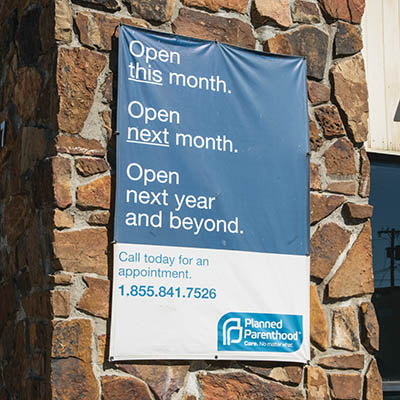 “When Donald Trump was elected, we began the fight of the century,” said Aaron Wilder, media officer for Planned Parenthood Great Plains and the organization’s political affiliate, Planned Parenthood Great Plains Votes. “The election was bleak for us. Pence has a record of being one of the most anti-women legislators of all time.”
“When Donald Trump was elected, we began the fight of the century,” said Aaron Wilder, media officer for Planned Parenthood Great Plains and the organization’s political affiliate, Planned Parenthood Great Plains Votes. “The election was bleak for us. Pence has a record of being one of the most anti-women legislators of all time.”
Once the results were in, Wilder said both organizations hit the ground running.
“I know what losing feels like as a progressive in Oklahoma, but typically, win or lose, you get an opportunity to take a breath and decompress, relax, think and plan again,” Wilder said. “For Planned Parenthood and lots of organizations, that breath never came.”
Prior to his current position, Wilder was the Oklahoma organizer for PPGP and PPGPV. He said the challenges, however daunting, came on the heels of two years of steady growth leading up to the election and an influx of support afterward.
“Since November, we’ve identified more than 4,000 new supporters in Oklahoma, a 29 percent increase,” Wilder said. “We’ve been able to translate that into real political power for Planned Parenthood Great Plains Votes and reproductive rights in Oklahoma.”
In January, PPGPV trained 300 Oklahomans to become activists in the federal fight over the Affordable Care Act. In April, they activated protesters to attend Republican Representative Jim Bridenstine’s town hall. The organization endorsed two candidates, Jacob Rosencrants in Norman and Karen Gaddis in Tulsa, in special elections this year. Both won seats in the State House.
Wilder said the expansion continues with new staff positions open, including the Oklahoma organizer role he vacated. A new health center is slated to open in Oklahoma City in March, with another breaking ground in Tulsa next year.
“We’ve been part of Oklahoma’s fabric since 1937,” Wilder said. “Planned Parenthood Great Plains is strong and isn’t planning on going anywhere.” —Becky Carman
Mike Dee
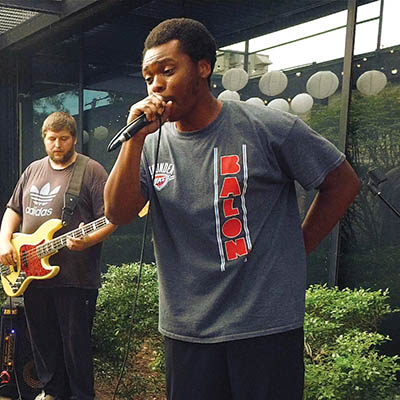 The next solo project from Tulsa rapper Mike Dee, member of hip-hop collective Oilhouse and powerful frontman with Stone Trio, explores the breaking point of Dee’s “love everybody” motto in the age of Trump and the Alt-Right.
The next solo project from Tulsa rapper Mike Dee, member of hip-hop collective Oilhouse and powerful frontman with Stone Trio, explores the breaking point of Dee’s “love everybody” motto in the age of Trump and the Alt-Right.
Dee, who is making all the beats himself for “The Saddest EP,” will include samples of Donald Trump on all seven tracks.
“I found a YouTube page where they collected all the most ridiculous shit he’s ever said, and I listen to it and go, ‘oh, that sucks,’ and then I sample it,” Dee said. Apart from the “ridiculous shit,” Dee sampled his own breathing patterns for beats.
Dee often whips up crowds into chanting “love everybody.” But he said exercising the creed is “definitely a difficult task” in a post-Charlottesville climate.
“Like, whoever the guy was that ran through that protest … it is hard to follow that motto,” Dee said. “But also, there is the kind of love that my mom gives me—she loves me, but if I’m super disrespectful, she’s gonna beat my ass. There is a way to love, and stand up for love … but also stand up for yourself.”
“For me, I know that racism exists … but not to the level that has been shown lately,” Dee said. “I’ve had people drive by and say the N-word, and people have followed me in stores, but now I have to be cautious where I am, and have crazy mofos that may try to prove something … I’m worried about my fam and my sisters, you know?”
“The Saddest E.P.” will condemn the current ills Dee sees in our nation, but he also hopes to start conversations with the people that may hate him for his skin.
“I just want to understand, and I want them to let me know where they’re coming from,” he said. “Because I don’t get it.” —Mitch Gilliam
Oklahomans for Equality
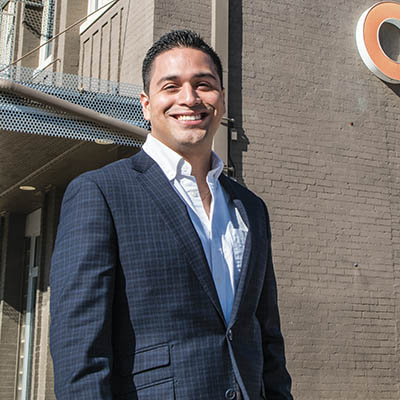 In its 12 years of existence, the Dennis R. Neill Equality Center in downtown Tulsa was never the target of serious vandalism—until 45 days into the Trump presidency. Police located 13 pellet bullets that punctured the Center’s front door and windows on March 6, damaging the bulletproof glass and alarming employees and volunteers.
In its 12 years of existence, the Dennis R. Neill Equality Center in downtown Tulsa was never the target of serious vandalism—until 45 days into the Trump presidency. Police located 13 pellet bullets that punctured the Center’s front door and windows on March 6, damaging the bulletproof glass and alarming employees and volunteers.
The Center houses the LGBT advocate organization, Oklahomans for Equality (OKEQ), as well as Dream Act Oklahoma and Mosaic, Tulsa Regional Chamber’s diversity business council.
“The safe zones that have been created in our country are being eliminated one by one,” said OKEQ Program Director Jose Vega. “I believe my work is to rebuild them with more concrete reinforcement and pull in even bigger allies than before. The shooting wasn’t even considered a hate crime, because the state doesn’t have a law that addresses hate crimes based on sexual orientation and gender identity. That has to change.”
Since the election, Jose says the number of suicide calls to OKEQ has tripled.
“After every presidential announcement or executive order, we keep getting calls saying, ‘I feel bad and I don’t wanna live,’” Vega said. “So, we knew we had to be proactive. We recently provided a series of free suicide prevention training.”
The key to fighting the resistance in Vega’s mind? Allies.
“We need to break down boundaries,” Vega said. “I identify as a Latino cisgender gay man, so while I connect and fight for Latino/immigrant and LGBT rights, I’m also a huge supporter for all other movements, like Black Lives Matter. As an ally, you may have a different connection than they do. Be willing to give them those connections and let them be the face of the movement. That [reinforces], ‘we’re all going to be behind you, helping you.’”
Vega sees signs of unity coming out of the resistance.
“After every disaster, mishap, or whatever you want to call it, we are seeing unity,” Vega said. “All these very different communities are coming together, little by little. People want to be part of something, and since the election our number of volunteers has tripled.” —Lauren Parkinson
Guillermo Rojas
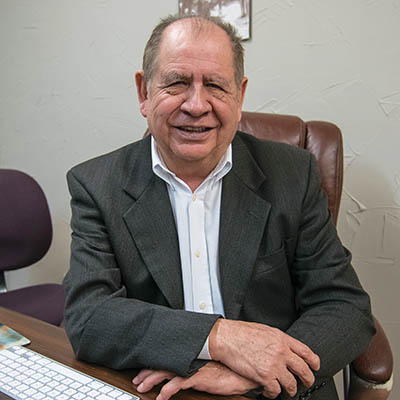 Guillermo Rojas had to watch his wife, Marina, and Tulsa-born infant son walk away. The family had traveled from Tulsa to the border town of Juarez to get an immigration waiver for his wife. Heading home, they were stopped at customs. Marina was told she couldn’t reenter the U.S. She was accused of human trafficking and of attempting to smuggle young Mateo across the border, and her American passport was stamped: “Not admissible to the United States for ten years.”
Guillermo Rojas had to watch his wife, Marina, and Tulsa-born infant son walk away. The family had traveled from Tulsa to the border town of Juarez to get an immigration waiver for his wife. Heading home, they were stopped at customs. Marina was told she couldn’t reenter the U.S. She was accused of human trafficking and of attempting to smuggle young Mateo across the border, and her American passport was stamped: “Not admissible to the United States for ten years.”
Guillermo pleaded with customs officials: “This is not true. This is not true.”
Mateo’s passport had not been validated by the immigration staffer when they crossed the bridge into Juarez; there was no proof he was ever in America. The officials took Marina’s waiver documents. She and Mateo traveled to her father’s house in Mexico City.
Emotionally shattered by a change of presidents and policy, Guillermo and his older son, Diego, returned to Tulsa, where the Rojases had lived for fifteen years.
During the Obama presidency, the path to these waivers was clearer. Months earlier, before the 2016 election, Guillermo helped Diego through the process. No hitches. Inspired by the ease of Diego’s immigration experience, Guillermo completed the paperwork for Marina’s waiver.
With the 2016 election season in full swing, the Immigration Department ground to a halt. Post-election, Trump tightened the screws. The Rojas family suffered.
Guillermo was “destroyed, the worst ever,” he said. But he called the American Consulate in Juarez every day. They knew of Marina’s case but couldn’t help and couldn’t say why. As three months passed, he wrote poems to his missing family.
In March, Guillermo’s daily query was answered. Marina’s papers were ready. He flew to Mexico City. Within two days, Marina had a visa and a restored passport. But as their car approached the border, they were uneasy.
“Anything to declare?” the guard asked.
“Only a bottle of tequila,” Guillermo said.
“Follow me.”
The words echoed in Guillermo’s ears. The guard punched some computer keys, stared awhile at the screen.
“Three bucks. OK, free to go.” A clear path.
But the path isn’t as clear for all Latinos. In his weekly Tulsa newspaper, La Semana, Guillermo encourages Dreamers to defy Trump.
“Maybe one day my little Mateo will be President.” —Steve Gerkin
Oklahoma Progressive Network
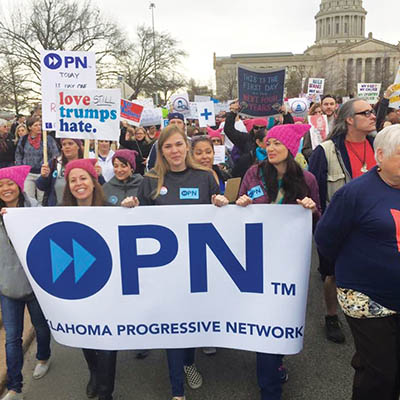 Founded on Facebook on the day of the election, the Oklahoma Pantsuit Nation began with a mission of sharing information and celebrating a Hillary victory. When Trump won, it quickly changed into Oklahoma Progressive Network, a grassroots organization aiming to inform and motivate Oklahomans to take political action.
Founded on Facebook on the day of the election, the Oklahoma Pantsuit Nation began with a mission of sharing information and celebrating a Hillary victory. When Trump won, it quickly changed into Oklahoma Progressive Network, a grassroots organization aiming to inform and motivate Oklahomans to take political action.
“We have a little over 11,000 people in our Facebook group, and people want to get out there and do something—knock on doors for a candidate, register voters—actually do something instead of sitting at home and complaining,” said Kasey Greenhaw, president-elect and current vice president of OPN.
In addition to full-time jobs and caring for their families, the eight OPN board members work with candidates to spread word about elections, create voter guides, organize voter registration events, create awareness for small elections, and connect constituents with candidates for whom they wish to canvass.
Most recently, OPN has organized the Gubernatorial Forum, which will be held in Oklahoma City at Will Rogers Theater on November 2 at 6 p.m. The forum will also be livestreamed on Facebook.
“We are calling it a forum because we don’t want it to be contentious; we just want answers to questions people have. We have a team of people working on the questions. There will not be a rebuttal—we are asking everyone the same questions, no one will be attacked,” said Greenhaw.
Greenhaw has reached out to two Republican candidates to participate, but as of the date of this printing, neither had responded.
“[OPN is] not specific to party. We want to get candidates that support equal rights for all citizens, support public schools, and have what is typically referred to as ‘progressive values,’” said Greenhaw. “I’m a registered Republican and so are many people in our organization. So, it’s not necessarily Democrats or Independents or anti-Republican like many people may think. It’s people that want to work toward the same goals that we have for the state.” —Mary Noble
Olivia Ramirez
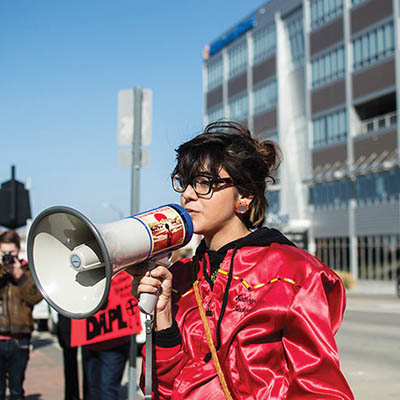 Last November, hundreds of Oklahomans protested the Dakota Access Pipeline (DAPL) at “Tulsa Marches with Standing Rock,” a rally organized by then-20-year-old Olivia Ramirez, who is of Wahzhazhe, Mvskoke, and Chichimeca Jonaz descent. The march led protestors through downtown Tulsa to the Bank of America building, where protesters staged a sit-in—some demonstrators even withdrew their money—and demanded that the company pull its funding for the pipeline.
Last November, hundreds of Oklahomans protested the Dakota Access Pipeline (DAPL) at “Tulsa Marches with Standing Rock,” a rally organized by then-20-year-old Olivia Ramirez, who is of Wahzhazhe, Mvskoke, and Chichimeca Jonaz descent. The march led protestors through downtown Tulsa to the Bank of America building, where protesters staged a sit-in—some demonstrators even withdrew their money—and demanded that the company pull its funding for the pipeline.
Ramirez was one of the protesters threatened with arrest, though no arrests were made. Remarkably, Ramirez had never organized a protest before, so she learned along the way.
“As an organizer, you have to make sure groups are accountable, because you have a limited time to get stuff done,” she said.
Ramirez has done most of her activist work with Arkansas Rising, a campaign aimed to stop the Diamond Pipeline. More recently she’s worked with the Good Hearted People’s Camp, a Native American organization and camp in Harrah, Oklahoma, which the organizers describe as “a spiritual, prayerful, peaceful camp for water protectors and land defenders.” She also participated in the recent Oilfield Prayer Day protest in Oklahoma City, a Midwest City protest against Jeff Sessions, and an Indigenous Peoples’ Day protest against Columbus Day.
As far as the resistance movement is concerned, Ramirez believes it’s having a positive effect in Tulsa.
“It brings up uncomfortable topics to people who might ignore them,” Ramirez said. “It’s reassuring to see such an active liberal population in Tulsa, even though we’re in such a conservative state.” —Trent Gibbons
Levi Parham
 During last year’s Standing Rock protests over the Dakota Access Pipeline (DAPL), Oklahoma songwriter Levi Parham found himself at a crossroads.
During last year’s Standing Rock protests over the Dakota Access Pipeline (DAPL), Oklahoma songwriter Levi Parham found himself at a crossroads.
He released his 2016 album, These American Blues, with Music Road Records, a label co-founded by Austin songwriter and former Oklahoman Jimmy LaFave and funded by Kelcy Warren. Warren is the CEO and chairman of Energy Transfer Partners, the operators of DAPL.
Protestors demanded Parham and other artists sever ties with Warren’s label. The songwriter called his contract with Music Road “basically like charity.”
“Nobody was going to make any money,” he said. He had never met Warren and landed at Music Road only by way of LaFave’s support.
For Parham, it was a gray area: He had no relationship nor any connection with Warren, only assistance from the label’s small staff. He credits songwriter Samantha Crain for putting the issue into perspective.
“She told me, ‘You’ve got to stand on the right side of history,’” he said. “I had to make a decision.”
In November 2016, Parham opted out of the second album in his contract and made a statement on Facebook, a subtle move with heavy implications.
“It meant publicly separating myself from people … who wanted nothing more than to help me and giving up knowing … I’d have the opportunity to make art,” Parham said. “Jimmy was going through cancer at the time. It was all a whirlwind of emotion.”
Music Road still owns These American Blues, which Parham did not have the funds to buy back. He said communication with the label about the album has been difficult but that his decision was the right one.
“I don’t regret it,” Parham said. “It was the best way I could stand in solidarity with Standing Rock.”
LaFave passed away from spindle cell sarcoma in May. DAPL began shipping oil to customers in June. —Becky Carman
New Sanctuary Network
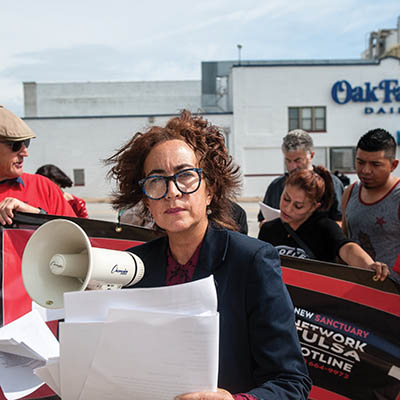 Every Thursday at noon, a small group of demonstrators gather outside the David L. Moss Tulsa County Jail and read a list of names: all of the undocumented individuals marked for deportation by ICE on the court docket that day. The reading usually takes several minutes. One of the goals of the group is to meet with and advocate for the families of jailed undocumented immigrants who are seeking to visit their loved ones.
Every Thursday at noon, a small group of demonstrators gather outside the David L. Moss Tulsa County Jail and read a list of names: all of the undocumented individuals marked for deportation by ICE on the court docket that day. The reading usually takes several minutes. One of the goals of the group is to meet with and advocate for the families of jailed undocumented immigrants who are seeking to visit their loved ones.
The group is called the New Sanctuary Network of Tulsa, and it’s headed by Rabbi Marc Boone Fitzerman, Reverend Alzaro Nova, Reverend Barbara Prose, and Project Director Linda Allegro.
“There’s been a revival of the sanctuary movement all over the United States,” Allegro said. “Currently there are about 35 to 40 individuals, undocumented people who have sought refuge in a house of worship in the United States. Usually the people that take sanctuary are women with children. They have no legal recourse. They don’t have any grounds to stay here … These are churches that are opening their hearts and their doors to harbor an undocumented immigrant who is experiencing an imminent threat of being deported.”
While sanctuary cities have been in major news stories of late, Oklahoma represents the opposite situation.
“ICE has an office at David L. Moss,” Allegro said. “The previous sheriff started it, and the current sheriff has continued it. They have specific pods that are ICE pods where they hold the detainees, and they’re usually at maximum capacity. You’re looking at 280 individuals at any time that are held for ICE.”
New Sanctuary believes that churches should be the last line of defense for undocumented immigrants seeking refuge. Rabbi Fitzerman, one of the group’s founders, is informed by his own family’s history.
“My wife’s parents came to this country after they were persecuted in Auschwitz and Bergen Belsen,” he said. “They were deported from their homes and, at the end of the war, had to wait in line for visas behind German nationals who were deemed useful to America during the Cold War. All four of my own grandparents were European Jewish immigrants to the United States. I feel intensely loyal to the idea of America as a refuge, a place where we work to relieve suffering and to shelter the dispossessed.” —Damion Shade
Black Lives Matter
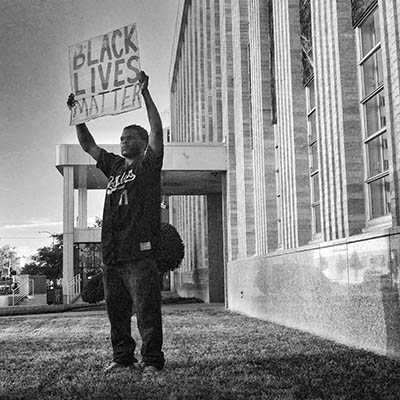 Mareo Johnson is the head of the Tulsa chapter of Black Lives Matter (BLM) and is on the legal redress committee at Tulsa’s NAACP branch. —Liz Blood
Mareo Johnson is the head of the Tulsa chapter of Black Lives Matter (BLM) and is on the legal redress committee at Tulsa’s NAACP branch. —Liz Blood
Liz Blood: How has the BLM movement changed in Tulsa over the last several years, and how has it changed specifically since Trump was elected?
Mareo Johnson: As far as Tulsa goes, [we’ve been] supporting the movement, but our certain group didn’t start until last [summer]. When Donald Trump became president, the dynamics kind of changed because it was causing people to resist more. He and Jeff Sessions want to make certain laws to hinder protests—and then here just lately start trying to make BLM and things like that labeled as terrorist groups, which is not true. During the Betty Shelby verdict, I was helping to keep the peace for better solutions. It’s about people making a difference where they can. And BLM is trying to make a difference with people who are really hurt, in more ways than one.
Blood: What is the long view of resistance? Do you see things differently in highly charged moments, or can you think about the future?
Johnson: With the Shannon Kepler conviction, I think that’s going to help in the future. That right there—in this time, in this moment, in this season of our lives—that was a pivotal moment. I believe it will help our city move forward and become a better city. Even though it wasn’t what I considered full justice. It was some justice, which brings some kind of hope to people in the community that change is coming. And it also sends a message to our law enforcement that people are going to hold them accountable. And they should hold each other accountable, and think twice before reacting with excessive force on- or off-duty.
I believe in the future things will get better. [The Betty] Shelby verdict didn’t go like I wanted it to go. But from these things we see the injustice. We see where something went wrong. I think, ok, well maybe this time it didn’t go the way I wanted it to go, but if there’s a next time, then it may be the time it goes like we want it to go. Like with Shelby, there was a “not guilty,” then with Kepler there was a “guilty”—but he got less than what he should have. But I see it as a step ahead.
Blood: How does the BLM movement fit into Tulsa?
Johnson: Tulsa needs, you know, a group or entity that the black community—that’s been harassed, faced policy brutality, racism, things like that—can go to, trust, and confide in and have hope in. That’s what BLM is. Because when you really look at it, Tulsa doesn’t have a group like that. The human rights department was done away with by the City.
It also fits in with the race massacre in 1921. That still lingers today. That’s something people don’t forget, and I don’t know if everyone feels the same way, but I feel there’s still something from that catastrophe that’s within people unconsciously. The hurt, the pain, even disappointment. Bringing awareness to the truth, to a people, that’s what BLM is.
We also stand against the violence that happens in our own community.
Oil and Gas
Though I’m in my thirties, white, and male, it’s weird being a fly on the wall in the business world of Tulsa. I’m an oil and gas professional, and I meet a lot with sales and technical types to work on deals regarding technology ventures. And I’m a pretty nice guy, which I think means most people in my line of work assume that I believe what they believe.
Things didn’t get really troubling ‘til the Trump election. There has always been tension between conservatives and liberals, but now that space is very dark. When I was a kid I used to watch documentaries about skinheads. They talked about the coming race war. I thought that was the silliest thing to worry about. I mean, normal people are chill—they want to get along with each other. They’re not fixated on mythical phenomena.
But now I’m starting to get nervous. Over the last year, my colleagues, who trust me and are by all accounts normal, have started talking about blacks and Mexicans as if they’re subhuman, i.e., “My wife and I were at the park the other day and this fat, black woman comes up to us and asks us for a handout. So typical.”
They talk about how non-white races are in for a rude awakening in the not-too-distant future, how it’s been a long time coming. They exchange knowing looks while they speak. I want to know what they’re so confident about. Are they bolstered by Trump’s utter lack of position on race relations? Are they spun up by the right-wing media’s attack on and dismissal of the Black Lives Matter movement? Or do they know something I don’t know?
I’m not sure what to make of grown, modern men giving serious, unironic consideration to racist ideology—or how to talk to them. —Name Withheld
Branjae Jackson
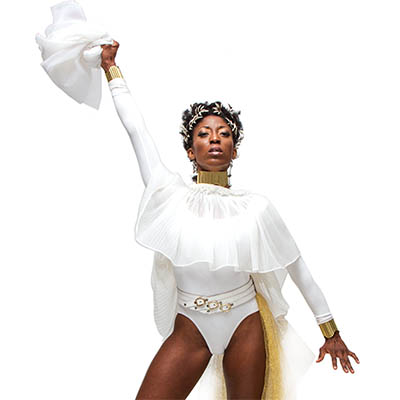 Tulsa-based singer, songwriter, and dancer Branjae Jackson advocates for her community and change. She finds that the Trump presidency has pushed her to find peace and focus her energy on music and the issues that matter to her. —Mary Noble
Tulsa-based singer, songwriter, and dancer Branjae Jackson advocates for her community and change. She finds that the Trump presidency has pushed her to find peace and focus her energy on music and the issues that matter to her. —Mary Noble
Mary Noble: Do you feel that the act of making music is a form of resistance?
Branjae Jackson: Making music is making magic. And that magic can change people—vibes and energy. Wanna get some rage out and break shit? Well, there’s music for that! Feel sexy and vibe with a romance? Music for that. It can make people feel something. It makes me feel something. And if it’s just right, that same something the listener feels connects to what I feel, and they push it back. Yes. It definitely can resist and lead others to resist.
Noble: Social justice issues were a part of your music before last year’s election. Has anything changed about the way you make music since Trump was elected?
Jackson: I noticed my writing evolving post-election when this wave of separation and negative energy birthed itself again. I’ve taken a softer approach by realizing how much power I actually have. I don’t have to accept the negative. I can speak my truth unapologetically and really not feel anything negative about someone else and their thoughts. We don’t have to agree, but this is my truth.
I resist Trump by specifically paying less and less attention to him. I mean, we already know the man’s unbalanced with evil intentions. To argue with each other, stress out, and worry—honestly, to me—is wasted energy and happy time … Remaining unsurprised at what he’s up to next brings a peace to me and makes me want to focus on the things I can contribute to change.
Holy Mother Collective
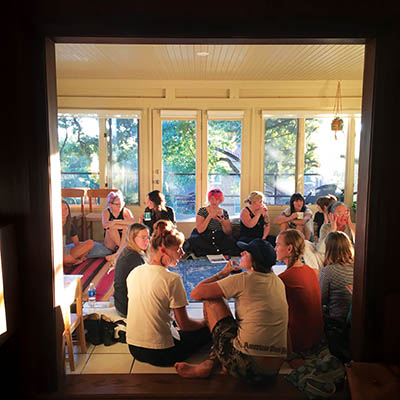 Sitting in a circle with dozens of fellow women artists and creators may not seem subversive or revolutionary. But a giddy, almost conspiratorial energy bubbled from woman to woman at the Holy Mother Collective’s first meeting in October. The collective is the brainchild of Cyterica Kahl and Lydia Cheshewalla, who were quick to point out that women simply gathering and supporting one another is itself an act of resistance.
Sitting in a circle with dozens of fellow women artists and creators may not seem subversive or revolutionary. But a giddy, almost conspiratorial energy bubbled from woman to woman at the Holy Mother Collective’s first meeting in October. The collective is the brainchild of Cyterica Kahl and Lydia Cheshewalla, who were quick to point out that women simply gathering and supporting one another is itself an act of resistance.
Cheshewalla also pointed out how thoroughly the capitalistic and individualistic mentality pervades American culture, and how having a supportive community around the individual artist is a form of subversion.
“We [women] compete everywhere else in life; I don’t wanna compete here,” she said.
“I love the DIY culture,” said Kahl. “I’m not gonna rely on a gallery to put up my art. I’m just gonna do it myself, and then there’s no rules.”
The collective’s concrete goal is to resist the barriers faced by women creators on a local level. Time- and skill-sharing are essential facets of the group, which will allow members to trade childcare for a massage or a yoga class for web design.
“Everyone I know is working four jobs and poor as shit,” Cheshewalla said.
Both founders agree that for whatever reason, female artists and creators in Tulsa are frequently overlooked. “At these meetings, I met all these amazing women doing really cool things,” said Kahl. “Like, how have I never met you before? How have I never heard your name?”
“Women work so quietly,” said Cheshewalla. “What could we accomplish if we’re all doing it together?”
Holy Mother Collective’s first public effort will be a market on December 1 at Chimera, coinciding with First Friday. —Anna Bennett
Oilfield Prayer Day
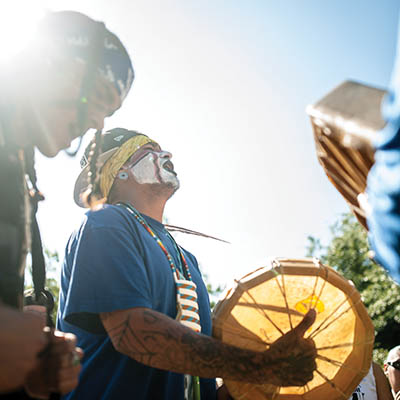 A planned protest feels like a dress rehearsal, especially in the moments leading up to the event. For the protest at the Oklahoma Corporation Commission on October 13, which Governor Fallin famously declared “Oilfield Prayer Day” in 2016, participants started milling around the front of the building a half-hour early. Captain Brent Sugg of the Oklahoma Highway Patrol was there to meet them.
A planned protest feels like a dress rehearsal, especially in the moments leading up to the event. For the protest at the Oklahoma Corporation Commission on October 13, which Governor Fallin famously declared “Oilfield Prayer Day” in 2016, participants started milling around the front of the building a half-hour early. Captain Brent Sugg of the Oklahoma Highway Patrol was there to meet them.
“I like to meet people and shake their hand,” Sugg said. He was friendly, accommodating even—an unsettling way to begin a protest. Everyone seemed to know everyone; everyone seemed to know their roles.
A group of young men wearing the uniform of anarchists—black everything, down to their shoes—were the first to arrive, and they were joined by a member of the professional clergy. He asked not to be named, saying, “I’m not here with the bishop’s awareness,” but his particular sect was obvious in his vestments. He was decked out in cassock and jewelry.
VICE News was doing preliminary interviews in the parking lot for a segment on Native American pipeline protests, which should air in March 2018. When Lakota/Absentee Shawnee activist and OU Ph.D. student Ashley McCray finally got free of the VICE cameras, she started the protest with a message to Governor Fallin, noting that Oilfield Prayer Day is a “slap in the face” to Native people. The governor’s original proclamation called on churches to pray; she would later amend the proclamation to make it more interfaith friendly, but the message was already clear.
“We were told that as long as the waters continued to run, this would be our land,” McCray said. “Instead, we were pushed into concentration camps called reservations.”
The emotion at the event came from the Native activists. They spoke of broken treaties, the destruction of Native bodies, the decimation of the land, and the grasping for profits. Prayer for more profits is a blasphemy of sorts, a furthering of the destruction of human life for corporate gain.
“We are pushed to extreme measures of putting our bodies on the line because you’re not listening,” McCray said.
In all, only four dozen people joined the protest early, many of them from the Oklahoma Chapter of the Sierra Club. They came with signs and T-shirts; they were polished, with prepared statements and business cards. But McCray’s shirt translated the emotion of the activists. It was a face with an inscription: “Let Them Drink Oil.” —Greg Horton


.jpg)
.jpg)
